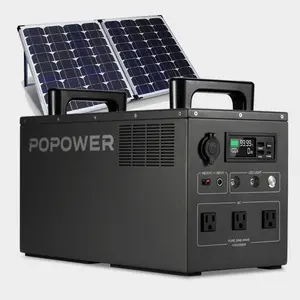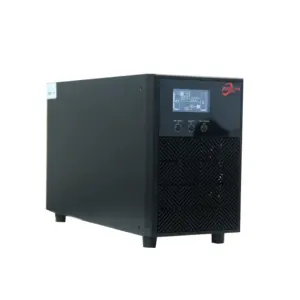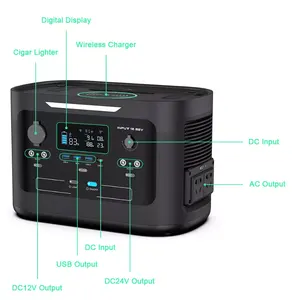The Role of Backup UPS in 220V Systems
A Backup Uninterruptible Power Supply (UPS) for 220V systems is indispensable for protecting electronic devices and systems against power disruptions, voltage surges, and other electrical anomalies. These units, tailored for 220-volt systems, are prevalent in settings that demand higher voltage, including data centres, healthcare facilities, and industrial environments. Their primary function is to ensure a dependable power source that maintains the operation of sensitive electronics during an outage or facilitates their orderly shutdown.
Backup UPS units for 220V systems operate on energy storage and conversion principles. They charge an internal battery while connected to the mains, which then supplies power to devices during an outage, guaranteeing continuous operation. These systems are equipped with circuits that detect power interruptions, seamlessly transition to battery power, and can initiate an alert or manage a systematic shutdown if needed. Some sophisticated models also adjust voltage and frequency to replicate mains power, delivering a consistent and clean output vital for delicate electronics.
Such systems are crucial in preserving data integrity and hardware functionality by providing a stable power source. They are available in a range of sizes and configurations to meet diverse requirements, from modest office setups to extensive industrial applications. Additionally, they offer electrical noise filtration, surge protection, and isolation from the main supply, which extends the lifespan of connected devices by protecting them from adverse electrical conditions.
Varieties of Backup UPS for 220V Systems
Diverse types of Backup UPS systems are engineered to cater to specific requirements and applications:
-
Single Phase Backup UPS: Suited for single-phase power needs typical in residential or small office environments, these systems support lighter power loads and are ideal for safeguarding individual computers, modems, and similar devices.
-
Three Phase Backup UPS: These are optimal for industrial settings or applications requiring three-phase power. Capable of handling substantial power loads, they are frequently employed in factories, workshops, and larger commercial premises.
-
Protection Systems: Certain Backup UPS models come with enhanced protection features like surge suppression, which is crucial for areas with unstable power grids or when using sensitive electronics.
-
Smart or Intelligent UPS Systems: These variants offer added capabilities such as remote monitoring and control via software or web interfaces, suitable for scenarios where uninterrupted service and real-time data access are paramount.
-
Scalability and Redundancy: For situations demanding high availability or reliability, scalable and redundant UPS options are available. These can be expanded or replicated to accommodate growing power needs or to provide backup in the event of a component failure.
Selecting the Right Backup UPS for 220V Systems
Choosing the appropriate Backup UPS for your enterprise requires evaluating several key factors. The UPS type is crucial; a small office might suffice with a standby UPS for basic outage protection, whereas a data centre may necessitate a sophisticated online UPS with scalability and comprehensive protection capabilities.
Battery type is another vital consideration. While lead-acid batteries are widespread and economical, they may offer limited longevity and need frequent maintenance. Conversely, lithium batteries provide extended service life and are lighter, albeit at a higher initial cost.
Furthermore, consider your power needs. For larger operations or specific requirements like three-phase power, opt for an enterprise-level UPS with modular expansion capabilities. Protection level is also a significant factor, ranging from basic surge protection to extensive defense against various power disturbances.
Discovering Backup UPS for 220V Systems on Alibaba.com
Alibaba.com distinguishes itself as a premier wholesale marketplace that connects businesses with an expansive array of Backup UPS systems for diverse commercial applications. As a B2B-focused platform, Alibaba.com grants businesses access to a global network of suppliers. Whether in search of a single-phase unit for smaller ventures or a robust three-phase system for large-scale operations, Alibaba.com caters to your specific needs.
The platform's intuitive interface enables buyers to sift through options based on phase requirements, battery type, application fields, and additional features like display type or eco-friendliness. With comprehensive product details and supplier profiles readily available, informed purchasing decisions are made easy. Additionally, Alibaba.com's Trade Assurance service offers extra security by protecting payments until delivery confirmation.
Ultimately, Alibaba.com is a comprehensive resource for businesses in need of dependable Backup UPS systems to ensure operational continuity. By providing customized trading experiences and support in local languages, Alibaba.com enables businesses of all sizes to prosper globally.
Frequently Asked Questions on Backup UPS for 220V Systems
What distinguishes single-phase from three-phase backup UPS systems?
Single-phase backup UPS systems are generally intended for lighter loads and residential use, whereas three-phase systems are engineered to efficiently manage larger power demands in industrial or commercial settings.
How should I calculate the necessary battery capacity for a backup UPS?
To determine the appropriate battery capacity for a UPS, tally the total power consumption of the devices you need to protect and select a UPS with a capacity that surpasses this total, ensuring sustained operation during outages.
Are backup UPS systems suitable for outdoor environments?
Certain backup UPS systems are designed for outdoor deployment, featuring sturdy casings and protection against elements such as dust and water, making them apt for telecommunication towers and other external installations.
Do portable backup UPS options exist for field or mobile use?
Indeed, portable backup UPS solutions that rely on battery power are available, ideal for fieldwork or scenarios necessitating mobility and a temporary power source.
What is the typical lifespan of backup UPS systems?
The lifespan of backup UPS systems varies but generally falls between 3 to 10 years, contingent on factors like usage, maintenance, and environmental conditions.
What features should I seek in a backup UPS to meet my business requirements?
Important features to consider include the system's capacity, efficiency, additional functionalities like LCD displays or USB ports, and the manufacturer's reliability and reputation.
Can backup UPS systems be tailored for particular uses?
Many suppliers provide customization options for backup UPS systems to suit specific uses, including bespoke capacities, functionalities, and branding.
What maintenance do backup UPS systems necessitate?
Regular maintenance for a backup UPS includes checking batteries, updating software, and cleaning internal components. Some systems may also require more maintenance depending on their design.
How does ambient temperature influence a backup UPS system's performance?
Elevated temperatures can accelerate battery wear and diminish system efficiency. It is crucial to choose a system capable of reliable operation within the anticipated temperature range for your application.
What protection do backup UPS systems offer?
Backup UPS systems provide varying levels of protection, including surge suppression, overcurrent safeguards, and in some cases, lightning and grounding defenses to shield against power surges and electrical incidents.
How does the waveform type affect a backup UPS system's compatibility with certain devices?
The type of waveform (e.g., simulated sine wave, pure sine wave) influences the UPS's compatibility with specific devices. Matching the waveform to the devices you aim to protect is essential.
Is any backup UPS system compatible with my computer or server?
Not all backup UPS systems are suitable for computers or servers due to variances in voltage needs and waveform types. Selecting a UPS tailored to the particular requirements of such equipment is crucial.
What advantages does an LCD display offer on a backup UPS system?
An LCD display on a UPS system provides immediate status updates, including battery levels, input voltage, and load capacity, which is useful for monitoring and managing the system.
































 浙公网安备 33010002000092号
浙公网安备 33010002000092号 浙B2-20120091-4
浙B2-20120091-4